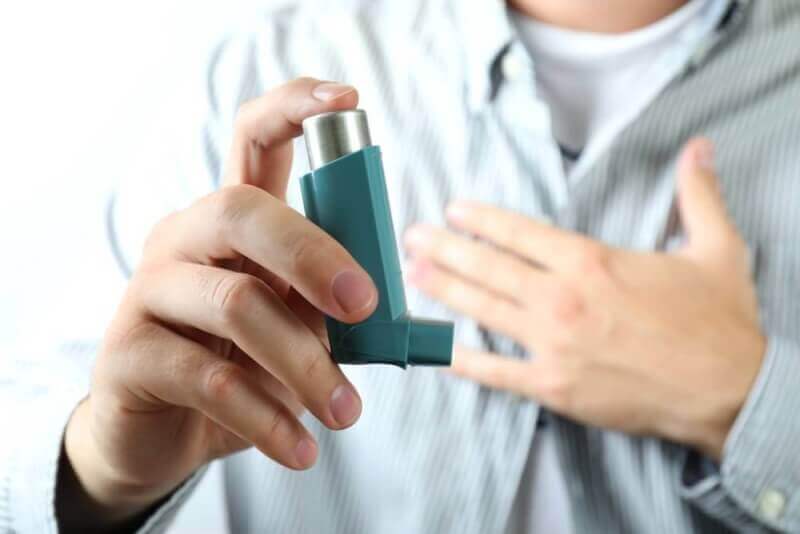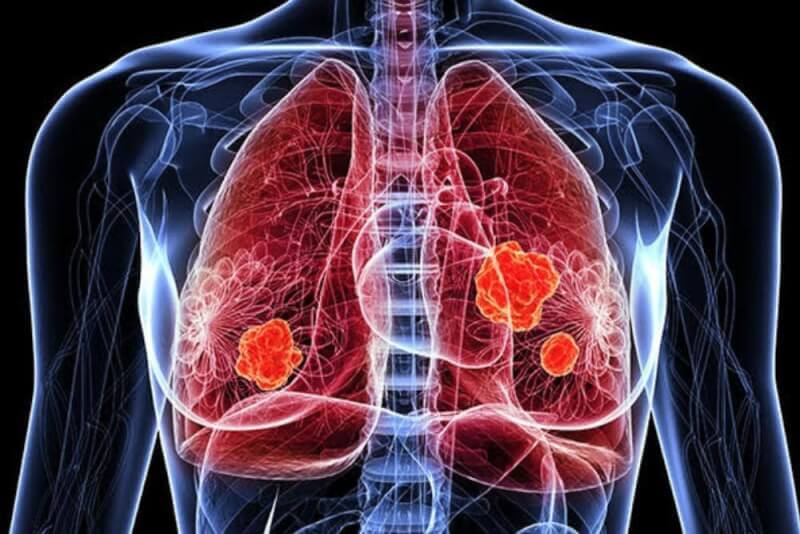30 Second Summary
- Asthma is a chronic lung disease that causes blockage and inflammation of the airways.
- Symptoms include shortness of breath, wheezing, chest tightness and coughing.
- It is a disease that can lead to serious consequences, but with appropriate treatment it can be controlled and significantly improve quality of life.
- There is no definitive cure, but various methods can be used to control symptoms, including medication, lifestyle changes and allergy shots.
What is asthma?
Asthma, one of the chronic disease options, causes obstruction of the airways and causes patients to breathe with difficulty. In asthma attacks that develop in response to triggers such as exercise, allergens, cold air and smoke, the smooth muscles around the airway contract. This leads to increased mucus production. Increased mucus secretion causes obstruction of the airways. Asthma, a disease that can affect both children and adults, usually causes coughing and shortness of breath.
People who live in cities with poor air quality, smoke or are frequently exposed to cigarette smoke, suffer from allergies and have a family history of asthma are more prone to asthma.
Asthma symptoms
Asthma is one of the diseases that manifests itself with periods of exacerbation. For this reason, symptoms only appear during these periods. Exacerbations occur when patients are exposed to triggers. Symptoms of asthma during an exacerbation include the following:
- Shortness of breath
- Pain or tightness in the chest
- Cough
- Wheezing or whistling sound when breathing
There are early warning signs before asthma attacks. Monitoring these symptoms makes it easier to manage asthma attacks. It is possible to list these symptoms as follows:
- Frequent and intermittent coughing at night
- Sleep disorders
- Feeling out of breath when speaking
- Headache
- Wheezing after exercise
- Sore throat
- Sneezing
- Runny nose
- Nasal congestion
- Decreased lung function in respiratory tests
- Rapid fatigue in daily work
- Unwillingness to perform daily tasks
Failure to recognize the preliminary symptoms of asthma attacks can cause the attack to be severe. Because severe asthma attacks affect patients more and the symptoms are as follows:
- Panic state
- Anxiety disorder
- Pale skin
- Sweating
- Bruising of lips and nails
- Speech impairment
- Rapid breathing
- Tense neck and chest
- Cough that won't stop
- Severe wheezing when inhaling and exhaling
Causes of asthma
The cause of asthma is not known exactly. However, research on this topic suggests that asthma can be caused by general health problems, family history, infections and environmental influences. Among the most common triggers in asthma, which varies greatly between patients, are the following:
- Preservatives and sulfites in processed foods and beverages,
- Medicines
- Some viral diseases
- Obesity
- GERD
- Stress
- Mood disorders
- Chemical odors and fumes
- Extreme hot or cold weather conditions
- Smoke
- Exercise
- Dust mites
- Air pollution
- Pets
- Pollen
- Living in a moldy or damp environment
- Born prematurely
- Maternal smoking in the womb
Types of asthma
Asthma is a disease that is divided into various types. As the factors that cause asthma vary, asthma is divided into different categories.
Allergic asthma
Allergic asthma, also known as atopic asthma, is characterized by flare-ups triggered by allergens such as dust mites or pollen. Approximately 90% of patients with allergic asthma also have other health conditions such as eczema, food allergies or hay fever. People with allergic asthma should avoid allergens as much as possible. In addition, it is necessary to use inhalers recommended by the doctor, which should be used daily, and relaxing inhalers to be used when asthma symptoms occur.
Symptoms of allergic asthma
Symptoms of allergic asthma caused by inflammation of the nasal membranes and reaction to allergens include the following:
- Nose swelling
- Redness of the nose
- Watery eyes
- Itching of the throat
- Frequent sneezing
Exercise-induced asthma
People with exercise-induced asthma do not have a diagnosis of asthma. However, patients have symptoms similar to asthma attacks during exercise. For this reason, they are diagnosed with exercise-induced asthma. Patients experience symptoms due to the narrowing of the airways without the production of mucus during exercise. It particularly affects professional athletes and people who exercise in cold conditions.
Exercise-induced asthma symptoms
Symptoms of exercise-induced asthma that occur with exercise include the following:
- Shortness of breath
- Cough with wheezing
Occupational asthma
The cause of occupational asthma is directly linked to the work that patients do. When people with occupational asthma are not at work, their symptoms improve. Moreover, the disease in these patients starts in adulthood.
Occupational asthma, a subtype of allergic asthma, is different from other types of asthma. Because in occupational asthma, patients are constantly exposed to triggers and their condition worsens. The occupational groups most affected by occupational asthma include nurses, miners, farmers, hairdressers, animal caretakers, woodworkers and painters.
Occupational asthma symptoms
Occupational asthma attacks occur mainly in the workplace and symptoms include
- Symptoms only occur at work.
- Nasal congestion
- Runny nose
- Cough
Bronchial asthma
In bronchial asthma, the narrowed airways irritate the bronchi after a while. This makes the bronchi sensitive. This is why, after a while, the bronchi begin to overreact to external triggers.
Symptoms of bronchial asthma
Symptoms of bronchial asthma can be listed as follows:
- Attacks can come suddenly
- Patients may feel attacks throughout the day and may be mildly severe.
Seasonal asthma
Asthma that flares up at certain times of the year is called seasonal asthma. Since asthma is a long-term disease, asthma attacks can occur even in the absence of exposure to triggers. They are triggered by illnesses such as colds or flu, especially during the cold months. Air pollution, pollen, storms or weather changes can also trigger seasonal asthma.
Symptoms of seasonal asthma
Symptoms of seasonal asthma may vary from patient to patient. The most common symptoms of seasonal asthma are as follows:
- Tightness or pain in the chest
- Wheezing
- Coughing
- Difficulty breathing
Non-allergic asthma
Non-allergic asthma, also called non-atopic asthma, goes into exacerbation without allergen triggers. For this reason, the cause of non-allergic asthma is not known. However, it can occur later in life and can be much more severe than allergic asthma. Non-allergic asthma is less common than allergic asthma.
Factors that can trigger non-allergic asthma include
- Perfumes
- Household cleaning products
- Air fresheners
- Viral diseases
- Air pollution
- Cold weather
- Smoking
- Burning wood
Symptoms of non-allergic asthma
Symptoms of non-allergic asthma are the same as symptoms of allergic asthma. However, allergens that can cause these symptoms cannot be detected in non-allergic asthma patients. Symptoms of asthma in allergic cases include the following.
- Nose swelling
- Redness of the nose
- Watery eyes
- Itching of the throat
- Frequent sneezing
Difficult asthma
Some people with asthma have a condition called difficult asthma. The reason for difficult asthma is that patients have allergies or other health problems that make it difficult to manage.
Symptoms of difficult asthma
Symptoms of difficult asthma include the following:
- Frequent asthma attacks
- Use of soothing inhalations at least 3 times a week
- Use of high doses of asthma medication
- Asthma symptoms that do not go away despite additional treatments
Severe asthma
Severe asthma, which affects approximately 4% of asthma patients, is a type of asthma in which symptoms are not relieved despite treatment. Different groups of medicines, especially long-term steroid tablets, are used to treat severe asthma.
Severe asthma symptoms
Patients with severe asthma have the following symptoms:
- Having more than two asthma attacks within a year
- Persistence of symptoms despite patients taking high doses of inhaled steroids, long-acting bronchodilators or prophylactic tablets
- Use of relaxing inhalations more than 3 times a week
Adult-onset asthma
Asthma usually starts in childhood. However, some people are first diagnosed as adults. This asthma is called late-onset or adult-onset asthma. Among the reasons for the onset of asthma in adulthood are the following:
- Stress
- Obesity
- Cigarette smoking
Childhood asthma
A significant proportion of patients diagnosed with asthma in childhood experience a reduction or complete resolution of symptoms as they get older. This type of asthma is also called childhood asthma. If childhood asthma is severe or moderate, then symptoms may return in adulthood.
Asthma that occurs at night
The type of asthma in which asthma symptoms occur at night is called nocturnal asthma. At least 75% of patients have asthma symptoms during night sleep. Nocturnal asthma is thought to be caused by too low or too high levels of certain hormones in the early morning due to the body's natural metabolism. Since asthma that occurs at night causes a decrease in the quality of sleep of patients, problems such as lack of concentration arise during the day. The treatment of asthma that occurs at night includes eliminating factors that may cause allergens in the bedroom and treating physiological factors such as nasal discharge with medication.
Aspirin-induced asthma
It is possible to talk about aspirin-triggered asthma if patients experience asthma symptoms after taking aspirin or medicines containing the active ingredients in aspirin. Aspirin desensitizing drugs are used in aspirin treatment triggered by aspirin.
Symptoms of asthma triggered by aspirin
In aspirin-induced asthma, symptoms appear after aspirin use. These symptoms include the following:
- Runny nose
- Sneezing
- Wheezing
- Breathing difficulties
Asthma with cough
One third of patients with chronic cough lasting more than 8 weeks have asthma. Asthma with cough, a type seen in both adults and children, can occur day or night. In asthma with cough, patients have a dry cough while other characteristic symptoms of asthma are absent. Generally, inhaled cortisol treatment gives successful results.
Asthma treatment
Asthma treatment is divided into three categories. These include breathing exercises, fast-acting medicines and long-term asthma control medicines. The treatment varies depending on the type of asthma, age and triggers.
Asthma quick relief treatments
In asthma quick relief treatments, the medicines recommended by the doctor should only be used in crisis situations.
Bronchodilators
It is a group of medicines that relax the muscles around the respiratory tract. In this way, patients' mucus production decreases and they start to breathe more easily. They can be used as inhalers or nebulizers.
First aid treatment for asthma
If someone around you has an asthma attack, you should first remind them to take their medication. You should make sure that he/she sits in an upright position while taking the medication. Use of 2 to 6 doses of the drug will usually provide symptom relief. However, if symptoms last longer than 20 minutes or if there is still no relief after the second round of medication, you should seek urgent medical attention.
Long-term medications for asthma control
Medicines used in the long-term drug treatment of an asthma attack must be taken daily. This reduces the severity of symptoms and lengthens the time between crises. However, they are not used to control the symptoms of a sudden asthma attack.
Anti-inflammatory drugs
This group of medicines facilitates breathing and reduces swelling and mucus production in the airways. It includes groups of corticosteroids and other anti-inflammatory drugs.
In addition, a group of anticholinergic drugs relaxes the muscles around the airways. They are usually used in combination with anti-inflammatory drugs.
Long-acting bronchodilators
Long-acting bronchodilators used in the treatment of asthma are a group of drugs that should only be used in combination with anti-inflammatory drugs.
Bronchial thermoplasty
Bronchial thermoplasty for patients with severe asthma uses electrodes to heat the bronchi. This helps the muscles around the airways to shrink. This shrinkage also helps to reduce contractions.








